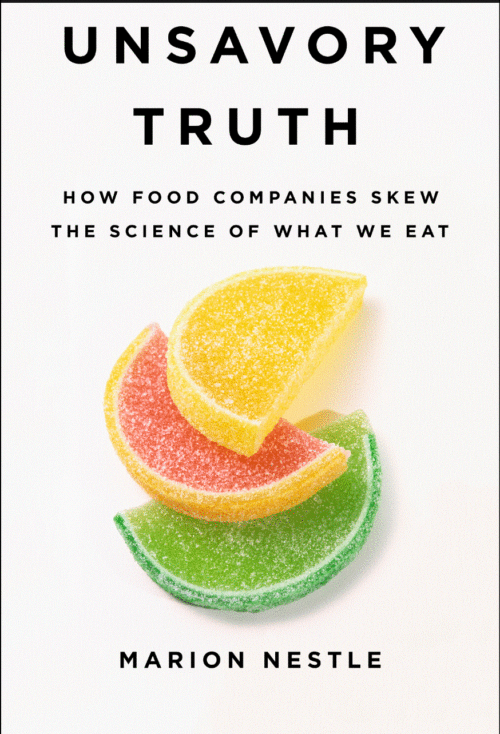I’m giving this lecture at UCSC, Sponsored by the Humanities Institute. Title: “Food Politics 2026: Sustainable Food in the Trump Era.” 6:00 p.m. Cowell Ranch Hay Barn, Ranch View Rd. Register here.
Diet-related disease stats: Japan
I’m reading The Japan Times this week and saw this article: “Healthy life expectancy” on the rise: survey
The article describes how “healthy life expectancy,” defined as years of life without nursing care or serious illness, rose in Japan between 2013 and 2016.
Health officials attribute the increase to a greater focus on better nutrition and more physical activity among the Japanese population.
Here are the stats:
| MEN, years |
WOMEN, years
|
|
| Healthy life
expectancy |
72.14 | 74.79 |
| Total life
expectancy |
80.98 | 87.35 |
| Gap | 8.84 | 12.35 |
In case this isn’t clear, the life expectancy for men is nearly 81 years, but nearly 9 of those years will be spent in poor health. For women, the life expectancy is more than 87 years, but more than 12 will be spent in poor health.
The survey data cover more than 700,000 people.
Under a 10-year health promotion plan introduced in fiscal 2013, the Japanese health ministry is working to extend healthy life expectancy by setting numerical targets for death rates caused by lifestyle-related diseases—heart disease, certain cancers, type 2 diabetes, and others caused by smoking and unhealthy eating, and drinking.
I had not heard of healthy life expectancy used in this way, but I think it works well to quantify how diet affects longevity.
Soda Politics: Japan style
I am in Japan this week and am fascinated to see that Coca-Cola produces special products with seasonal themes, just in time for cherry blossoms (which, alas, are not quite out yet):

And it offers fruity varieties:
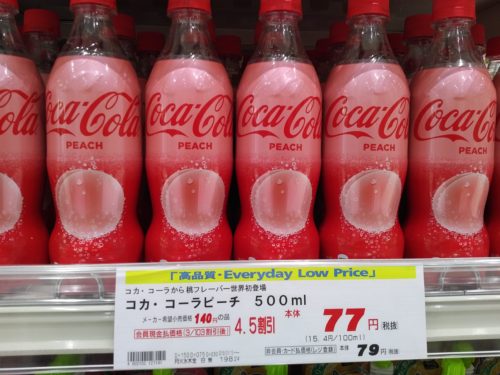
For the first time, Coca-Cola is adding alcohol to canned Coke (the rum, as in “Rum and Coca-Cola” was not premixed). It is launching the new alcohol-laced soft drink for the Japanese market.
Japanese supermarkets are already crowded with alcohol-infused soft drinks and teas. I got this at the OK Supermarket in Yokohama:

Here’s a close up of one variety:
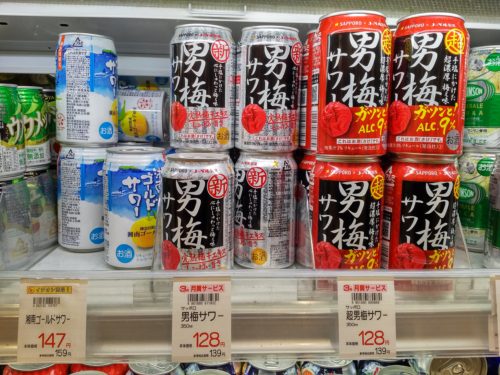
Most soft drinks in Japan, with or without alcohol, are local brands.
Will alcohol help Coke increase market share? Can’t wait to find out.
Eat breakfast, prevent obesity (say Nestlé and General Mills)
I haven’t posted an industry-funded study with predictable results in a while but when I saw this headline from FoodNavigator-Asia, I couldn’t resist.
The headline: “The most important meal of the day: Daily breakfast may lower obesity risk in schoolchildren — Nestlé study.”
High marks to FoodNavigator-Asia for naming the funder in the headline.
Its article referred to this study:
Breakfast consumption among Malaysian primary and secondary school children and relationship with body weight status – Findings from the MyBreakfast Study, by E Siong Tee, Abdul Razak Nurliyana, A Karim Norimah, Hamid Jan B Jan Mohamed , Sue Yee Tan, Mahenderan Appukutty, Sinead Hopkins, Frank Thielecke, Moi Kim Ong, Celia Ning, Mohd Taib Mohd Nasir. Asia Pacific Journal of Clinical Nutrition 2018;27(2):421 – 432.
Purpose: To determine the relationship between breakfast consumption and body weight status among primary and secondary school children in Malaysia among 5,332 primary school children aged 6 to 12 years and 3,000 secondary school children aged 13 to 17 years.
Results: “The proportion of overweight/obesity was higher among breakfast skippers (boys: 43.9%, girls: 30.5%) than regular breakfast eaters (boys: 31.2%, girls: 22.7%)…. Compared to regular breakfast eaters, primary school boys who skipped breakfast were 1.71 times (95% CI=1.26-2.32, p=0.001) more likely to be overweight/obese, while the risk was lower in primary school girls (OR=1.36, 95% CI=1.02-1.81, p=0.039) and secondary school girls (OR=1.38, 95% CI=1.01-1.90, p=0.044).”
Conclusion: “Regular breakfast consumption was associated with a healthier body weight status and is a dietary behaviour which should be encouraged.”
Author disclosures: “This study was funded by Cereal Partners Worldwide (CPW), Lausanne, Switzerland and Nestlé R&D Center, Singapore. Sinead Hopkins and Frank Thielecke were working for CPW, Lausanne, Switzerland, and Moi Kim Ong and Celia Ning were working for Nestlé R&D Center, Singapore, when the study was conducted. All authors declare that they have no conflicts of interests.”
I was particularly interested in this study for several reasons:
- Cereal Partners Worldwide is a joint venture between Nestlé and General Mills. They have an interest in promoting breakfast cereals.
- Nevertheless, the authors who work for CPW or Nestlé believe that their employment with companies with vested interests in the outcome of research creates no conflict of interest.
- Breakfast, as Julia Belluz of Vox puts it, is often dessert in disguise.
- This particular study was performed by some of the same investigators discussed in the New York Times as part of its Planet Fat series. See: Fuller T, O’Connor A, Richtel M. In Asia’s fattest country, nutritionists take money from food giants. NY Times, Dec 23, 2017.
No, I do not believe that breakfast is the most important meal of the day (I’m not much of a breakfast eater). Eat when you feel hungry.
It does make sense to think that children should be fed at regular intervals and should not go to school hungry. It also makes sense that regular meals encourage healthier patterns. But preventing obesity? That seems like a stretch, especially when the study’s funders have a financial interest in selling breakfast cereals.
The link between obesity and food systems: World Bank
I’m late in seeing this but the World Bank published this report linking food systems to obesity last year.
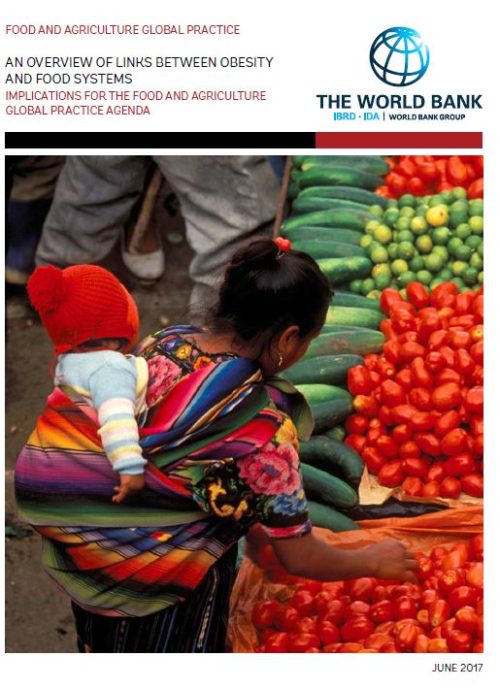
It’s got lots of charts and tables and ends with actions that can be taken in food production systems to improve food quality. It’s wonky, but useful.
Weekend reading: Organic Profit / Prophet
Andrew N. Case. The Organic Profit: Rodale and the Making of Marketplace Environmentalism. University of Washington Press, 2018.
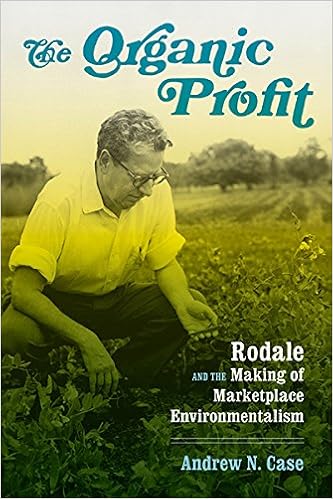
I did a blurb for this one:
Organic Profit is a great read for anyone interested in knowing how the Rodales and Prevention Magazine helped bring organic foods from cult to mainstream and from pesticide-free produce to environmentally conscious lifestyles. This is biography, social history, and contemporary politics, all viewed through the lens of the fastest growing segment of the U.S. food system.
Here are a few brief excerpts from the last couple of chapters:
- The surge of public interest and engagement with environmental issues in the 1980s provided the Rodale Press with an opportunity to make a renewed case for reforming the food system. As a privately held firm that did not need to meet the quarterly demands of shareholders, the company enjoyed the freedom to pursue projects that did not create immediate returns. To address the farm crisis, the company relied on the tools of the marketplace…to generate public support for reforming how food was grown, distributed, and consumed in the 1980s.
- Yet the impact of these efforts was limited at best….Rodale’s story does not resolve the tension between prophecy and profits, but it does illustrate the complexities of green consumerism and the many unresolved questions about the choices we face in an era of unprecedented environmental change….
- The crowded marketplaces of consumer societies have succeeded in providing an array of choices at the exact same time that consumer societies have failed to tackle global climate change and many other issues of health, equity, and sustainability.
Food Navigator’s Special Edition on Sports and Fitness
FoodNavigator.com collects its recent articles about sports and fitness into a Special Edition: Sports & fitness: From niche to mainstream:
Devices enabling us to track our diet, sleep, food intake and exercise regime – coupled with a new breed of personalized nutrition apps – are giving regular consumers access to tools and data that have historically remained the preserve of elite athletes and fitness freaks.
But is this creating new opportunities for food and beverage companies? Has the audience for sports nutrition products (bars, powders, beverages, gels, shots and supplements) evolved? And as ordinary mortals and weekend warriors start to engage with the category, are their needs the same as those of the hardcore sports nutrition audience?
- Competition heats up in large and still growing sports drink category: Hoping to cash in on the steady growth of the already sizeable sports and energy drink category, manufacturers at Natural Products Expo West in March will showcase a variety of functional beverages featuring an ever-expanding variety of plant-based proteins, natural sweeteners designed to help cut calories and sugar and other endurance-boosting ingredients… Display
- NOOMA finds white space in the sports drink category: ‘People want something that will rehydrate them without the added sugar and ingredients they can’t pronounce’: Would a professional athlete drink this? The founders of NOOMA – one of a new wave of sports drinks boasting cleaner labels and less sugar – can reliably answer in the affirmative, as both Jarred and Brandon Smith played hockey for a living, and formulated their own drink, because they were not happy with the sugary, lurid-hued electrolyte beverages they were chugging down to stay hydrated… Read
- Athletes and fitness community increasingly embracing personalization: The link between personalization and athletes of all levels will become stronger as scientific advances “cut through the noise and show results that are objective”, says the CEO of InsideTracker… Read
- Protes unveils protein popcorn: ‘We’re the first ones to bring function to the category’: The ready-to-eat popcorn category has been pretty lively in recent years, but all the innovation has all been driven by branding and flavor, rather than functionality, claims Brooklyn-based brand Protes, which is looking to bring incremental growth to the category with the launch of popcorn with 10g protein/serving… Read
- ‘Sarcopenia is the new osteoporosis’: Abbott continues to explore solutions to counter muscle loss: Awareness and concern around age-related muscle loss is rapidly increasing, but many older consumers are in need of better education around what their protein needs are, and how best to get there, says Abbott… Read
- Lenny & Larry’s: We didn’t set out to create a category, but that’s what happened: With its distinctive brand and commitment to high protein, Lenny & Larry’s has carved out a loyal following and success across multiple retail channels, so what’s next for the company?.. Read
- Adaptogens, CBD and nootropics rise as consumers consider their emotional & mental well-being: More products boasting the energy-managing, cognitive-enhancing and mood-moderating effects of adaptogens, CBD and nootropics will break out in 2018 as consumers continue to seek holistic and preventive ways to manage their mental health, according to trend spotters with SPINS… Read
When are added sugars not? The answer in FDA-speak.
Nutrition labels may seem self-evident but it takes volumes of Federal Register notices to explain how every word works. When it comes to food labels, the devil is in those details.
Take “Added Sugars,” coming soon to a food label near you.
How does the term apply to honey and maple syrup or, for that matter, sugar itself. These are sugars ready to add.
Pure honey and maple syrup producers are worried that when you see grams of Added Sugars on their labels, you will think that these natural products have been adulterated with—gasp—High Fructose Corn Syrup.
The producers of sugar-sweetened cranberry products are also concerned. They worry that the added sugars will discourage you from buying cranberries.
Here is how the FDA suggests dealing with these “problems,” in quotes because they are problems for producers, not you and me—we know what “added” means.
The purpose of this draft guidance is to advise food manufacturers of our intent to exercise enforcement discretion related to the use in the Nutrition Facts label of a symbol “†” immediately after the added sugars percent Daily Value information on single ingredient packages and/or containers of pure honey or pure maple syrup and on certain dried cranberry and cranberry juice products that are sweetened with added sugars and that contain total sugars at levels no greater than comparable products with endogenous (inherent) sugars, but no added sugars.
Got that?
Pure honey and maple syrup get a “†” indicating that they have no more sugar than any other comparable sugar.
Cranberries are more complicated:
With respect to the labeling of certain cranberry products, cranberries are a naturally tart fruit, and certain dried cranberries and cranberry juice products have added sugars added to them to bring the total sugars per serving up to levels comparable to the levels of non-cranberry competitor products that contain equivalent amounts of total sugars, but whose labels list zero “added sugars” because their fruit products are inherently sweet.
Did you get that?
If I read this FDA-speak correctly, the FDA is making an exception for cranberries. It agrees that the Added Sugars in cranberries also deserve a “†”.
Why is FDA allowing this? The Draft Guidance explains:
We received comments from the cranberry industry to the final rule and subsequent correspondence that the added sugars declaration would be detrimental to the cranberry industry by implying that cranberry products are less nutritious than competitive products that have similar amounts of total sugars and nutrients.
These comments were similar to those we received which noted that grape juice contains 36 grams of total sugar with no added sugars while cranberry cocktail, with sugars added for palatability because cranberries are naturally tart, generally contains 28 grams of total sugars including 25 grams of added sugars and has 30 fewer calories per serving than 100% grape juice.
Likewise, comments explained that sweetened dried cranberries contain 29 grams of total sugars including 25 grams of added sugars per serving while raisins contain 29 grams of total sugars with no added sugars per serving. Both sweetened dried cranberries and raisins have the same number of calories per serving and a similar nutrient profile.
In translation, you are not supposed to be concerned about the Added Sugars in cranberries.
But couldn’t you could buy real cranberries and add a whole lot less sugar than that?
Chalk this as a win for cranberry lobbyists.
The documents
- Download the Draft Guidance
- Federal Register Notice
- Constituent Update
- Changes to the Nutrition Facts Label
- Additional Labeling Guidance

